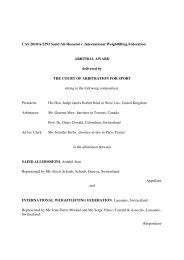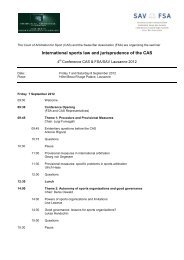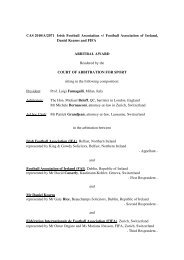(CAS) Bulletin - Tribunal Arbitral du Sport / TAS
(CAS) Bulletin - Tribunal Arbitral du Sport / TAS
(CAS) Bulletin - Tribunal Arbitral du Sport / TAS
Create successful ePaper yourself
Turn your PDF publications into a flip-book with our unique Google optimized e-Paper software.
element” or an “international dimension”<br />
within the meaning of Art. 14 of the Rules of<br />
Arbitration of Respondent 2 (TFF-Rules of<br />
Arbitration). This element and this dimension<br />
would result fi rstly from the fact that he is not<br />
only a citizen of Turkey but also of the United<br />
Kingdom. As such he would be a national in<br />
the British football market and not fall within<br />
the quotas for foreigners there. Furthermore<br />
an international dimension would result from<br />
the fact that the supplementary employment<br />
contract was drafted in English and contained<br />
“an international arbitration clause (FIFA<br />
Arbitration)”. Moreover the roots and the<br />
centre of the interests of the Appellant and<br />
his family would be in England; after the<br />
termination of the Contract the Appellant<br />
and his family would have gone back to<br />
England and looked for a new employer there.<br />
Finally the international dimension also<br />
results from the fact that the Appellant was<br />
imposed a four months ban by Respondent<br />
2. Whilst the latter was subsequently lifted<br />
by the Arbitration Chamber of Respondent<br />
2, this would give the case an international<br />
dimension because <strong>du</strong>e to the ban it would<br />
have become more diffi cult for the Appellant<br />
to fi nd a new employer on the worldwide<br />
market for football players.<br />
4.3.3.2 Art. 14 of the TFF Rules of Arbitration,<br />
whether on the basis of the Appellant’s<br />
translation or that of the Respondents’ (above<br />
at 4.1.3) must be interpreted in the light of the<br />
FIFA Regulations, namely Article 22 of the<br />
FIFA Regulations on the Status and Transfer<br />
of Players. This is specifi cally acknowledged<br />
by the Appellant in his appeal to the Federal<br />
<strong>Tribunal</strong>. The decisive criterion for the<br />
interpretation of Art. 14 of the TFF-Rules of<br />
Arbitration is accordingly the aforesaid FIFA<br />
norm.<br />
Art. 22 (b) of the FIFA Regulations on the<br />
Status and Transfer of Players determines<br />
the jurisdiction of FIFA for employmentrelated<br />
disputes between a club and a player<br />
that have any international dimension 23 .<br />
According to the FIFA offi cial commentary<br />
an “international dimension” within the<br />
meaning of that provision is given when the<br />
player concerned is a foreigner in the country<br />
concerned (Commentary on the Regulations<br />
for the Status and Transfer of Players).<br />
23. Translator’s note: In English in the original text.<br />
Accordingly an international dimension or a<br />
foreign element within the meaning of Art. 14<br />
of the TFF Rules of Arbitration interpreted<br />
in the light of the FIFA Regulations is given<br />
only when the claimant is a player who must<br />
be considered as a foreigner in the country<br />
of the Respondent football federation.<br />
According to an interpretation consistent with<br />
the FIFA Rules of Art. 14 of the TFF Rules<br />
of Arbitration, none of the other elements<br />
relied upon by the Appellant is relevant to<br />
give the dispute a foreign connection, namely<br />
the fact that the Appellant lives in England,<br />
his second citizenship, the language in which<br />
the supplementary employment contract was<br />
drafted or the ban effective on the transfer<br />
market worldwide. The Appellant cannot<br />
challenge that fi nding by reference to nr 4b<br />
of the Commentary on the Regulations for<br />
the Status and Transfer of Players as the<br />
developments there do not refer to Art. 22<br />
(b) of the FIFA Regulations but to Art. 22<br />
(a). That provision regulates disputes between<br />
a player and a federation as to a claim from<br />
an interested party in relation to such ITS<br />
Request, in particular regarding its issuance 24 .<br />
As mentioned above (above at 4.4.2) the<br />
dispute between the Parties does not involve<br />
a claim in connection with the issuance of<br />
a certifi cate of transfer but exclusively the<br />
alleged breach of contractual provisions by<br />
Respondent 1. The Appellant rightly does not<br />
claim that the employment dispute between<br />
the Parties would have originated from<br />
the fact that FIFA was requested to issue a<br />
certifi cate of transfer. His argument that the<br />
<strong>Arbitral</strong> tribunal itself would have assumed<br />
an international dimension of the facts by<br />
“applying” Art. 23 PILA is equally off the<br />
mark. The <strong>Arbitral</strong> tribunal merely pointed<br />
out in the reasons as an obiter dictum how the<br />
Swiss rules of confl icts of law in Art. 23 PILA<br />
preempt the issue of multiple citizenships, yet<br />
the aforesaid provision was not applied, let<br />
alone resorted to in order to determine the<br />
issue at hand.<br />
Accordingly an international dimension or a<br />
foreign element within the meaning of Art.<br />
14 of the TFF Rules of Arbitration would<br />
only have been realized if the Appellant were<br />
to be considered as a foreigner in a dispute<br />
with a Turkish football club. The Appellant<br />
rightly does not attempt to dispute seriously<br />
24. Translator’s note: In English in the original text.<br />
Jugements <strong>du</strong> <strong>Tribunal</strong> Fédéral / Judgment of the Federal <strong>Tribunal</strong><br />
-<br />
221





